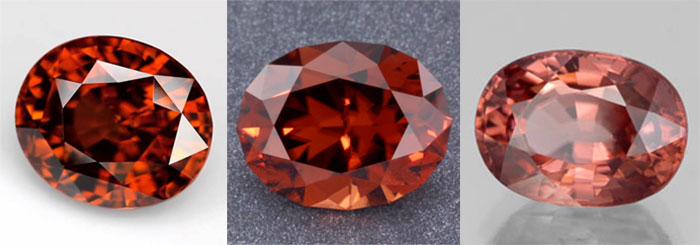Hyacinth gemstone
Home ➤ Encyclopedia of gems ➤ Hyacinth gemstonePhysical properties of hyacinth
| Hardness: | 7-7.5 out of 10 on the Mohs scale |
| Luster: | strong glassy |
| Transparency: | transparent |
| Color: | red-brown, yellow, yellow-red |
Characteristics of hyacinth
Hyacinth (also spelled Jacinth) gemstone is a type of zircon. Hyacinth is a very beautiful stone, it has a diamond luster and good transparency. In addition, hyacinth has a very high hardness, for which jewelers highly value this gem.

Hyacinth has other names - yakint, peradol, hyacinth topaz, jargon, ligurium, rachuratka.
The color of hyacinth is usually orange, red, raspberry-purple, pink, brown. And blue hyacinths are very rare (you should be careful with these, since you can artificially achieve blue color - brown hyacinths are heat-treated for this).
Hyacinth got its name in honor of the hyacinth flower, which in turn was named after the ancient Greek hero Hyacinth, whose drops of blood Apollo turned into flowers.
The gemstone hyacinth has long been known to mankind. True, this stone was often confused with sapphires, quartz or topaz. Later, only the red variety of zircon was called hyacinth (maybe because these stones were similar in color to coagulated blood). Among some peoples, hyacinths were valued very highly - on a par with diamonds, chrysolites and emeralds. And in the Revelation of John the Theologian, it is indicated that hyacinth, along with eleven other precious stones, adorns the walls of Heavenly Jerusalem.
However, from ancient times, hyacinth tricks were also made. For example, they “burned out” hyacinths to complete transparency and sold them as diamonds, since hyacinth is a strong stone and its iridescence is very similar to diamond.
The most famous hyacinth deposits are located in Thailand, Sri Lanka, Australia, Madagascar and Russia (there are excellent zircon-ilmenite ores in the Omsk region).
| ★ Aquamarine gemstone | |
| See also: | ★ Rubellite gemstone |
| ★ Tanzanite gemstone |





